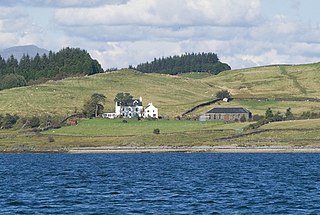Shuna Island
From Wikipedia, the free encyclopedia
From Wikipedia, the free encyclopedia
Shuna Island[6] or simply Shuna is an island in Loch Linnhe, offshore from Appin, in Argyll and Bute, Scotland. The island is approximately two kilometres (1+1⁄4 miles) long and one kilometre (5⁄8 mi) wide, and extends to some 155 ha (383 acres) in total. The island is characterised by a table topped hill at its southern end.[7] The name Shuna is probably derived from the Norse, for "sea island".[1] The island is separated from Appin by the Sound of Shuna.
| Scottish Gaelic name | Siùna[1] |
|---|---|
| Meaning of name | Probably "sea island" from Norse[1] |
| Location | |
| OS grid reference | NM916490 |
| Coordinates | 56.59°N 5.395°W |
| Physical geography | |
| Island group | Loch Linnhe |
| Area | 155 ha (383 acres) |
| Area rank | 121 [2] |
| Highest elevation | Tom an t-Seallaidh 71 m (233 ft) |
| Administration | |
| Council area | Argyll and Bute |
| Country | Scotland |
| Sovereign state | United Kingdom |
| Demographics | |
| Population | 0[3] |
| References | [4][5] |

Shuna is recorded in a late 16th-century document as belonging to John Stewart, the Laird of Appin.[5] He may have built Castle Shuna, a small tower-house, which is now in ruins and lies at the south end.[8] In the 18th century, Shuna Farmhouse replaced Castle Shuna as the residence on the island: it is a Category B listed traditional farmhouse dating from the 1740s.[9] Opposite Castle Shuna, at the head of Loch Laich, is the island fortress of Castle Stalker, also historically a possession of the Stewarts of Appin.[10]
The island forms part of the Lynn of Lorn National Scenic Area, one of 40 in Scotland.[11]
In 2012 the island was placed on sale via agents Savills for £1.85 million.[12]
Seamless Wikipedia browsing. On steroids.
Every time you click a link to Wikipedia, Wiktionary or Wikiquote in your browser's search results, it will show the modern Wikiwand interface.
Wikiwand extension is a five stars, simple, with minimum permission required to keep your browsing private, safe and transparent.